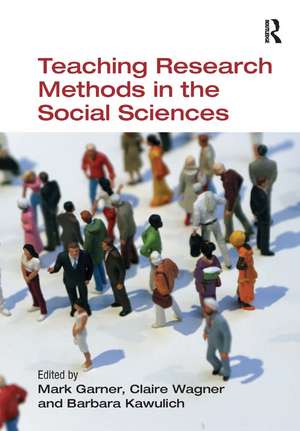Teaching Research Methods in the Social Sciences
Editat de Mark Garner, Claire Wagner, Barbara Kawulichen Limba Engleză Paperback – 28 aug 2009
| Toate formatele și edițiile | Preț | Express |
|---|---|---|
| Paperback (1) | 357.12 lei 3-5 săpt. | +24.40 lei 4-10 zile |
| Taylor & Francis – 28 aug 2009 | 357.12 lei 3-5 săpt. | +24.40 lei 4-10 zile |
| Hardback (1) | 1005.80 lei 6-8 săpt. | |
| Taylor & Francis – 28 aug 2009 | 1005.80 lei 6-8 săpt. |
Preț: 357.12 lei
Nou
68.36€ • 74.28$ • 57.46£
Carte disponibilă
Livrare economică 01-15 aprilie
Livrare express 15-21 martie pentru 34.39 lei
Specificații
ISBN-10: 0754673545
Pagini: 264
Dimensiuni: 156 x 234 x 19 mm
Greutate: 0.38 kg
Ediția:New ed
Editura: Taylor & Francis
Colecția Routledge
Locul publicării:Oxford, United Kingdom
Cuprins
Notă biografică
Recenzii
Descriere
How can excellence in the teaching of research methods be encouraged and ensured?Research methodology is now a component of most postgraduate and many undergraduate programmes in the social sciences. However, the status and function of research methods training varies considerably, and much of the existing literature is geared to students rather than to lecturers teaching such courses. The authors of this book believe that it is timely to begin to develop a 'pedagogical culture' relating to research methods -- an exchange of ideas within a climate of systematic debate, investigation and evaluation surrounding all aspects of teaching and learning in the subject. This book is intended as a preliminary step towards developing such a pedagogical culture. It contains contributions from a range of authors, who are involved in the teaching of research methods in different countries and within a variety of disciplines. Their aim is to establish the extent to which there are common concerns and challenges and to demonstrate ways in which these are being met. The book is intended to provide both a stimulus and source materials for the development of a more substantial and systematic literature in the field. The book will be of great interest to all those teaching research methods courses within social science disciplines.


























